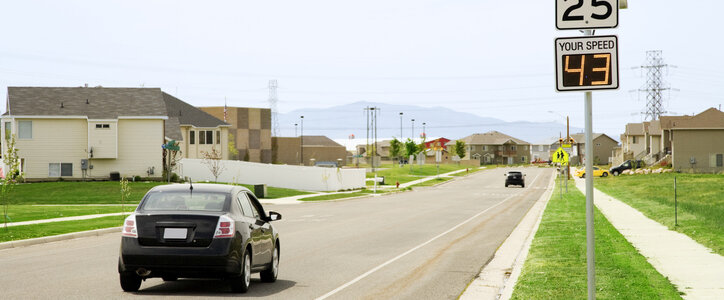If you’ve been cited for speeding in the state of New York, you may think paying the fine is your only option. Speeding tickets are expensive — they can cost up to $600 plus possible jail time — but the related costs can be even more expensive. An increase in insurance premiums, surcharges, and a possible license suspension can end up costing far more than a ticket over time.
Two Types of Speeding
As in most states, drivers in New York may be cited for driving over the speed limit or driving too fast for conditions. Going over the posted limit is a straightforward issue. Assuming a speed limit sign was posted and visible, a driver who exceeds that limit may be ticketed for speeding.
The law against driving too fast for conditions can be found in the New York State Vehicle and Traffic Law Section §1180. Under this law, an officer can determine that you are exceeding a safe speed limit when weather or other considerations create hazardous conditions.
Proving Speeding
Radar and laser devices are commonly used to measure a driver’s speed. When these technologies are properly calibrated, the information they provide is considered to be accurate. However, radar and laser speed monitors aren’t always 100% accurate.
A visual speed estimate from an experienced officer may also be needed to prove speeding.
The practice of pacing — when an officer follows a driver and records the speed on an official calibrated speedometer — can also prove speeding. In some instances, a visual speed estimate from a qualified officer is enough to prove a driver was over the speed limit. A combination of all of these methods may also be used to confirm speeding.
Reasons to Fight a Speeding Ticket
If you believe you’ve been issued a citation unfairly, it is possible to contest a ticket and win. Reasons to consider fighting the ticket in court include:
- You were driving less than five miles over the speed limit
- There were no posted speed limit signs
- Weather and road conditions were favorable
- You have reason to believe the technology used was inaccurate
The consequences of a speeding ticket can be costly and ongoing. Speak with an experienced traffic ticket lawyer to understand your rights and avoid paying fines and fees you don’t deserve.
What to Do if You Are Stopped for Speeding
How you handle yourself during a traffic violation stop could affect the overall outcome. To start, remain calm and respectful even if you disagree with the officer’s assessment of your speed. Arguing or losing your temper may land you in even more hot water.
Do not try to persuade the officer to recant the citation. Sign the paper citation if applicable.
Carefully check all the information on your ticket copy. It should include:
- Your contact information
- The officer’s name
- The location of your offense
- The posted speed limit
- The speed you were going (or accused of going)
- The preliminary court date
If any of the information is missing or incorrect, notify the officer at the scene to make corrections.
Know Your Options
Understanding all of your options can save money and confusion in the long run. If you wish to fight the ticket, make sure you know where and when to show up in court. Additionally, find out whether there are documents you need to bring.
To pay the fine, read the ticket carefully and follow all the directions. If you don’t have any prior speeding tickets, attending driving school may be an option. Do not ignore the ticket, even if you are an out-of-town visitor.
The New York Traffic Ticket Lawyers help drivers fight unfair speeding tickets and other violations in Central New York.

